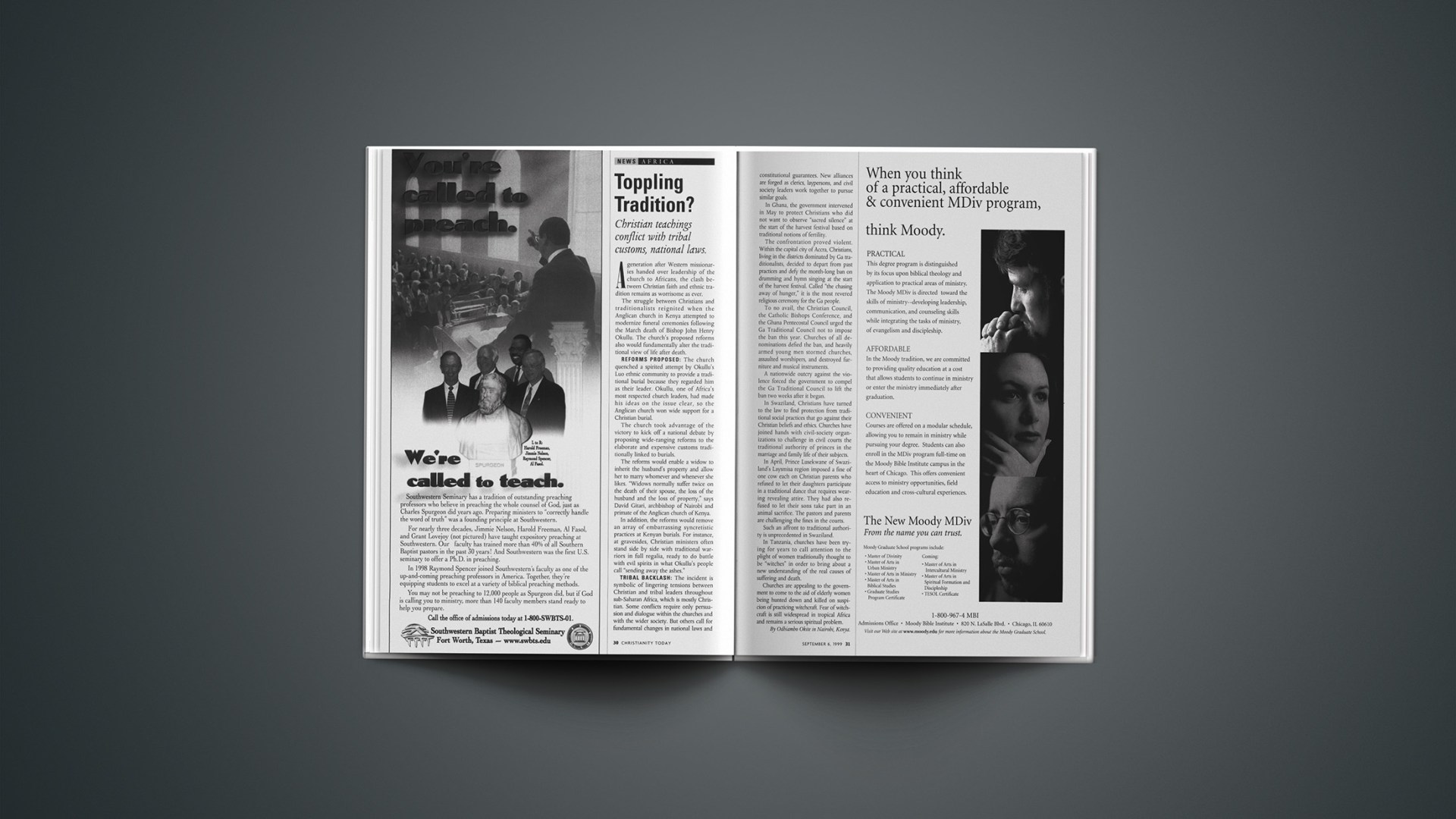A generation after Western missionaries handed over leadership of the church to Africans, the clash between Christian faith and ethnic tradition remains as worrisome as ever.
The struggle between Christians and traditionalists reignited when the Anglican church in Kenya attempted to modernize funeral ceremonies following the March death of Bishop John Henry Okullu. The church’s proposed reforms also would fundamentally alter the traditional view of life after death.
REFORMS PROPOSED: The church quenched a spirited attempt by Okullu’s Luo ethnic community to provide a traditional burial because they regarded him as their leader. Okullu, one of Africa’s most respected church leaders, had made his ideas on the issue clear, so the Anglican church won wide support for a Christian burial.
The church took ad vantage of the victory to kick off a national debate by proposing wide-ranging reforms to the elaborate and expensive customs traditionally linked to burials.
The reforms would enable a widow to inherit the husband’s property and allow her to marry whomever and whenever she likes. “Widows normally suffer twice on the death of their spouse, the loss of the husband and the loss of property,” says David Gitari, archbishop of Nairobi and primate of the Anglican church of Kenya.
In addition, the reforms would re move an array of embarrassing syncretistic practices at Kenyan burials. For instance, at gravesides, Christian ministers often stand side by side with traditional warriors in full regalia, ready to do battle with evil spirits in what Okullu’s people call “sending away the ashes.”
TRIBAL BACKLASH: The incident is symbolic of lingering tensions between Christian and tribal leaders throughout sub-Saharan Africa, which is mostly Christian. Some conflicts require only persuasion and dialogue within the churches and with the wider society. But others call for fundamental changes in national laws and constitutional guarantees. New alliances are forged as clerics, laypersons, and civil society leaders work together to pursue similar goals.
In Ghana, the government intervened in May to protect Christians who did not want to observe “sacred silence” at the start of the harvest festival based on traditional notions of fertility.
The confrontation proved violent. With in the capital city of Accra, Christians, living in the districts dominated by Ga traditionalists, decided to depart from past practices and defy the month-long ban on drumming and hymn singing at the start of the harvest festival. Called “the chasing away of hunger,” it is the most revered religious ceremony for the Ga people.
To no avail, the Christian Council, the Catholic Bishops Conference, and the Ghana Pentecostal Council urged the Ga Traditional Council not to impose the ban this year. Churches of all de nominations defied the ban, and heavily armed young men stormed churches, assaulted worshipers, and destroyed furniture and musical instruments.
A nationwide outcry against the violence forced the government to compel the Ga Traditional Council to lift the ban two weeks after it began.
In Swaziland, Christians have turned to the law to find protection from traditional social practices that go against their Christian beliefs and ethics. Churches have joined hands with civil-society organizations to challenge in civil courts the traditional authority of princes in the marriage and family life of their subjects.
In April, Prince Lusekwane of Swaziland’s Laysmisa region imposed a fine of one cow each on Christian parents who refused to let their daughters participate in a traditional dance that requires wearing revealing attire. They had also re fused to let their sons take part in an animal sacrifice. The pastors and parents are challenging the fines in the courts.
Such an affront to traditional authority is unprecedented in Swaziland.
In Tanzania, churches have been trying for years to call attention to the plight of women traditionally thought to be “witches” in order to bring about a new understanding of the real causes of suffering and death.
Churches are appealing to the government to come to the aid of elderly women being hunted down and killed on suspicion of practicing witchcraft. Fear of witchcraft is still widespread in tropical Africa and remains a serious spiritual problem.
Copyright © 1999 Christianity Today. Click for reprint information.










